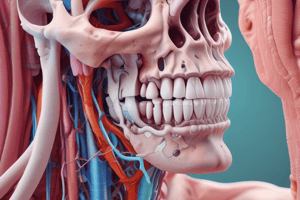Podcast
Questions and Answers
What is the frontal sinus?
What is the frontal sinus?
- A space within the frontal bone (correct)
- A type of cartilage
- The entrance to the auditory tube
- A conchae in the nasal cavity
What are the superior nasal conchae?
What are the superior nasal conchae?
They are bony structures in the nasal cavity that help to filter and humidify air.
What are middle nasal conchae?
What are middle nasal conchae?
Bony structures that facilitate airflow through the nasal cavity.
What are inferior conchae?
What are inferior conchae?
What is the nasal vestibule?
What is the nasal vestibule?
What are external nares?
What are external nares?
What is the hard palate?
What is the hard palate?
What is the oral cavity?
What is the oral cavity?
What is the tongue?
What is the tongue?
What is the mandible?
What is the mandible?
What is the lingual tonsil?
What is the lingual tonsil?
What is the hyoid bone?
What is the hyoid bone?
What is the thyroid cartilage?
What is the thyroid cartilage?
What is the cricoid cartilage?
What is the cricoid cartilage?
What is the trachea?
What is the trachea?
What is the thyroid gland?
What is the thyroid gland?
What is the esophagus?
What is the esophagus?
What are vocal folds?
What are vocal folds?
What is the glottis?
What is the glottis?
What is the laryngopharynx?
What is the laryngopharynx?
What are aryepiglottic folds?
What are aryepiglottic folds?
What is the epiglottis?
What is the epiglottis?
What is the oropharynx?
What is the oropharynx?
What is the palatine tonsil?
What is the palatine tonsil?
What is the soft palate?
What is the soft palate?
What is the entrance to the auditory tube?
What is the entrance to the auditory tube?
What is the pharyngeal tonsil?
What is the pharyngeal tonsil?
What is the nasopharynx?
What is the nasopharynx?
What are internal nares?
What are internal nares?
What is the nasal cavity?
What is the nasal cavity?
Flashcards are hidden until you start studying
Study Notes
Nasal Cavity and Related Structures
- Frontal Sinus: Air-filled cavities located within the bones of the forehead, contributing to resonance and reducing skull weight.
- Superior Nasal Conchae: Bony structures in the nasal cavity, involved in air filtration, temperature regulation, and moisture retention.
- Middle Nasal Conchae: Positioned below the superior conchae, assists in humidifying and cleaning inhaled air.
- Inferior Conchae: The largest conchae, these bone structures enhance air turbulence, aiding in effective filtration and warming.
- Nasal Vestibule: The front area of the nasal cavity, lined with skin and containing hairs that trap dust and debris.
- External Nares: The nostrils, serving as the entry point for air into the nasal cavity.
- Hard Palate: The bony roof of the mouth, separating the oral cavity from the nasal cavity for proper air and food passage.
- Oral Cavity: The mouth area, involved in digestion and speech, containing teeth, tongue, and salivary glands.
- Tongue: A muscular organ that aids in food manipulation, swallowing, and speech; it has taste buds for flavor perception.
- Mandible: The jawbone, the only movable bone of the skull, crucial for chewing and speaking.
- Lingual Tonsil: Located at the base of the tongue, these lymphoid tissues help in immune response.
- Hyoid Bone: A U-shaped bone in the neck, supporting the tongue and providing attachment for muscles.
- Thyroid Cartilage: The largest cartilage in the larynx, providing structure and protection for the vocal cords.
- Cricoid Cartilage: A ring-shaped cartilage below the thyroid that supports the airway and anchors vocal cords.
- Trachea: The windpipe, transporting air to and from the lungs; lined with cilia to trap particulates.
- Thyroid Gland: An endocrine gland located in the neck, regulating metabolism, growth, and development through hormone secretion.
- Esophagus: A muscular tube connecting the throat to the stomach, facilitating the passage of food.
- Vocal Fold: Folds of tissue that vibrate to produce sound; essential for phonation and voice modulation.
- Glottis: The opening between the vocal folds, playing a crucial role in sound production and airflow regulation.
- Laryngopharynx: The lower part of the pharynx located behind the larynx, serving both respiratory and digestive functions.
- Aryepiglottic Fold: A fold of tissue from the side of the epiglottis to the arytenoid cartilage, aiding in protecting the airway.
- Epiglottis: A flap of cartilage that covers the windpipe while swallowing, preventing food from entering the airway.
- Oropharynx: The middle portion of the pharynx, connecting the oral cavity to the pharynx; involved in swallowing and respiration.
- Palatine Tonsil: Lymphoid tissues located on either side of the oropharynx, part of the immune system.
- Soft Palate: The flexible back portion of the roof of the mouth, essential for swallowing and speaking.
- Entrance to Auditory Tube: The opening that connects the middle ear to the nasopharynx, important for equalizing ear pressure.
- Pharyngeal Tonsil: Also known as adenoids, located in the nasopharynx, important for immune response.
- Nasopharynx: The upper part of the pharynx, behind the nasal cavity, involved in the respiratory system.
- Internal Nares: Internal openings of the nasal cavity leading to the nasopharynx.
- Nasal Cavity: The hollow space behind the nose, responsible for filtering, warming, and humidifying inhaled air.
Studying That Suits You
Use AI to generate personalized quizzes and flashcards to suit your learning preferences.



